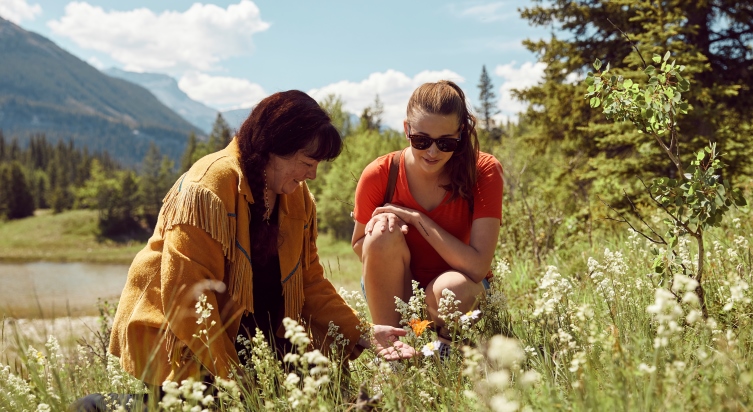By Laura Mushumanski
(ANNews) – The bush and the natural world teach us to be connected to the askîy (land) and everything our ancestors knew about healing. The plants have a symbiotic relationship with everything living on the askîy and are here to aid us in sickness and in health. The spiritual teachings of the askîy have been passed on from our ancestors before us and continue to be passed on to the next generations. And even if our inherent knowledge of the askîy has been lost, we can still reconnect with the askîy, that is a part of us, because we are all a part of Mother Earth.
“If you have askîy, you have everything. If you have the askîy you will always be looked after,” is what the grandmother of Brenda Holder spoke of during her time preserving and practicing traditional Indigenous maskihkîy (medicine).
Holder is a fourth-generation knowledge keeper of traditional Metis maskihkîy. She emphasizes the importance of what our natural environment and wild plants are teaching us, and the significant teachings, lessons and gifts behind illnesses.
There was always a purpose behind Holder’s grandmother’s teachings, that was something specific as she demonstrated an activity, like berry picking, and the truth to what they were saying.
“A way of working with the maskihkîy, in a way it was almost meditative, and you could literally see [my grandmother] connecting with the maskihkîy, and it was through her and the maskihkîy and the person she was treating that needed her attention. That struck me the most – how very deeply connected she was to the ill person, the maskihkîy and the askîy.”
It is a gift and of great importance to continue to preserve Indigenous culture. And at a young age, Holder was taught that, “keeping my family, values, knowledge, and traditions alive, keeps culture alive.”
At a pivotal time throughout the entire globe, COVID-19 has highlighted the whole essence of everything Indigenous people traditionally have known about maskihkîy and illnesses. When observing how people behaved themselves during the early stages of the pandemic – by purchasing an abundance of non-perishable food items – Holder states that, “this virus has really brought these teachings home in a very poignant way.” The pandemic is seen as a gift, the unexpected situations that came to us, our ancestors understood the art and the very important lesson in preservation – not to harvest everything, to ensure the longevity of everyone.
Traditionally in Indigenous culture, everyone had a role within their community to provide for each other and look after each other. Our ancestors had an innate understanding of their own health and longevity, because of their deep connection to culture, teachings of the askîy and how to work with the askîy to extract maskihkîy that they needed.
“You enter into a sacred contract, to live a good and clean life on the plants’ and animals’ behalf.”
When practicing a traditional way of life, respect is shown to the animals being hunted for meat that is providing nourishment for our families. The stories told from each piece of hide we wear on our feet and our backs, connects us to our culture, ancestors and the askîy. Our ancestors passed on the teachings of harvesting, hunting and gathering sustainably and for us to be mindful of ensuring a better world – to respect both past and future generations.
“I think it is important to highlight the very essence of keeping the culture alive, even in today’s standards.”
Holder emphasizes the importance of continuing to remember the spiritual teachings – the askîy teachings, from the people that have gone before us. Our ancestors have put so much of themselves into the askîy, their livelihood, hard work, blood, sweat and tears – ensuring a better world for us. To respect the askîy is to respect the teachings reaching back in history, in time, for the benefit of the people that have gone before us.
“To have an innate understanding of traditional maskihkîy, maskihkîy needs to make yourself well.”
Holder has been gifted with the teachings of traditional Metis maskihkîy, and over the years has been able to blend her cultural world with western knowledge. She has studied, practiced and continues to learn and understand plants, how maskihkîy work and she respects the maskihkîy as being part of her family. Since 2000, Holder has been given the opportunity to take interested participants onto the askîy and teach them to learn and understand the askîy. Holder is the founder of Mahikan Trails and continues to practice spiritual teachings. “The answer is always in the bush, no matter what, always ask the maskihkîy [for the answers you are seeking].”
A few notable sacred plants within Alberta, that have been preserved through traditional cultural knowledge are: Blueberry, Cranberry, Horsetail, Labrador, Nettle, Raspberry, Sage, Wild Mint, Wild Rose, Willow and Yarrow.
Here is a recipe for respiratory health, clearing a cluttered mind, and good memory:
- Half a handful of Spruce Tree needles, chopped
- Hardened sap from Spruce Tree
- Large bowl
- Hot water
- Tea towel
Place Spruce Tree needles and sap into a large bowl, fill the bowl halfway with hot water, breathe in the hot water/Spruce Tree aroma while covering the back of head with a tea towel.
Brenda Holder is the owner of Mahikan Trails. She is an advocate for Indigenous tourism, and shares her knowledge during guided tours within the Rocky Mountains. For more information, contact Brenda via email, [email protected].
Laura Mushumanski is a Local Journalism Initiative reporter for Alberta Native News.



Be the first to comment on "Mahikan Trails: What the askîy (land) teaches us about our livelihood"